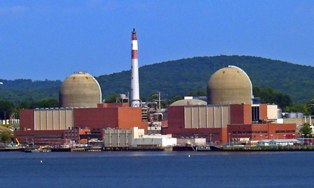The existing cooling systems at the Indian Point nuclear power plant in New York State violate the federal Clean Water Act, state environmental regulators have reportedly told plant owner Entergy. The ruling threatens the relicensing of the plant for a further 20 years of operation.
 |
Cooling towers would be a highly costly addition to the Indian Point plant (Image: Entergy) |
Indian Point's "once through" cooling system withdraws up to 2.5 billion gallons of water per day from the Hudson River to cool its reactors, returning it to the river at a higher temperature afterwards. DEC claims that millions of fish, including the endangered shortnose sturgeon, and other organisms are killed annually by this process.
Entergy has 30 days to request a public hearing on the permit's rejection. Company spokesman Jim Steets told Reuters, "We're disappointed in the notice of denial, but we expect to have an opportunity to convince the DEC it made a mistake."
"We're disappointed in the notice of denial, but we expect to have an opportunity to convince the DEC it made a mistake."
Jim Steets, Entergy spokesman
|
The proposed policy would apply to nearly all facilities designed to withdraw 20 million or more gallons of water per day and that require a State Pollution Discharge Elimination System (SPDES) permit - unless an operator can demonstrate that closed cycle cooling technology cannot physically be implemented at a particular location. In such as case, DEC will require other technologies to achieve essentially the same level of protection for aquatic life as closed cycle cooling. Such determinations, DEC said, are made when an operator applies for or renews a SPDES permit.
Entergy said that it would cost some $1.1 billion over 19 years to construct cooling towers at Indian Point. Steet noted that the installation of cooling towers would also involve shutting down both reactors for about 42 weeks. He said that Entergy's proposed "cylindrical wedge-wire" system to screen out fish and larvae during water intake at the plant would take about three years to install and cost about $100 million. Steet commented, "It would reduce the impact of the plant's operations on drawing in fish and larvae from the Hudson River much, much sooner. It will be much more effective than cooling towers over the 20-year licence renewal period."
The water-quality certificate is a prerequisite to the US Nuclear regulatory Commission (NRC) issuing an extended operating licence. Entergy has applied to renew the operating licences of Indian Point units 2 and 3 for a further 20 years. The units' current licences are due to expire in September 2013 and December 2015, respectively. Unit 1 of the plant was shut down in 1974.
Exelon warned in January that it might have to close its Oyster Creek nuclear power plant after New Jersey officials issued a draft permit requiring cooling towers to be constructed. The plant currently discharges heated water into a canal that is connected to Barnegat Bay.
Currently, of the USA's total of 104 nuclear power reactors, 60 use once-through cooling from rivers, lakes or the sea, while 35 use wet cooling towers. Nine units use dual systems, switching according to environmental conditions.
Spin-off off
The denial of a water-quality certificate by New York regulators is the latest in a series of recent setbacks that Entergy has faced.
In February, the Vermont Senate overwhelmingly voted against the extension of the operating licence of the state's only nuclear power plant - Entergy's Vermont Yankee plant - for a further 20 years beyond 2012. Its reasons for voting against renewing the plant's operating licence included safety concerns, as well as worries that electricity prices in the state could be higher and more volatile if Entergy continues operating the reactor. Entergy's licence renewal application for Vermont Yankee - which supplies around one-third of the state's electricity - is currently being reviewed by the applicable regulatory agencies.
In late March, the New York Public Service Commission (NYPSC) rejected Entergy's proposal to spin off six nuclear power plants, including three in New York State, into a new company called Enexus saying that the move was not in the public's interest. Entergy announced the spin-off in November 2007. The proposal was approved in 2008 by both the Federal Energy Regulatory Commission (FERC) and the Nuclear Regulatory Commission (NRC). It had also been given approval by Michigan and Massachusetts regulators. The Vermont Public Service Board had delayed making a decision on the proposal.
Entergy has now announced that it has cancelled its plans for the spin-off and will "unwind the business infrastructure associated with the proposed separate non-utility nuclear generation and nuclear services companies while it evaluates and works to preserve its legal rights."
The company said it would record a charge of 40 to 45 cents per share ($75.6 million to $85.1 million) for costs associated with scrapping the spin-off plan.
Researched and written
by World Nuclear News





_13505.jpg)
_87975.jpg)
_67826.jpg)






